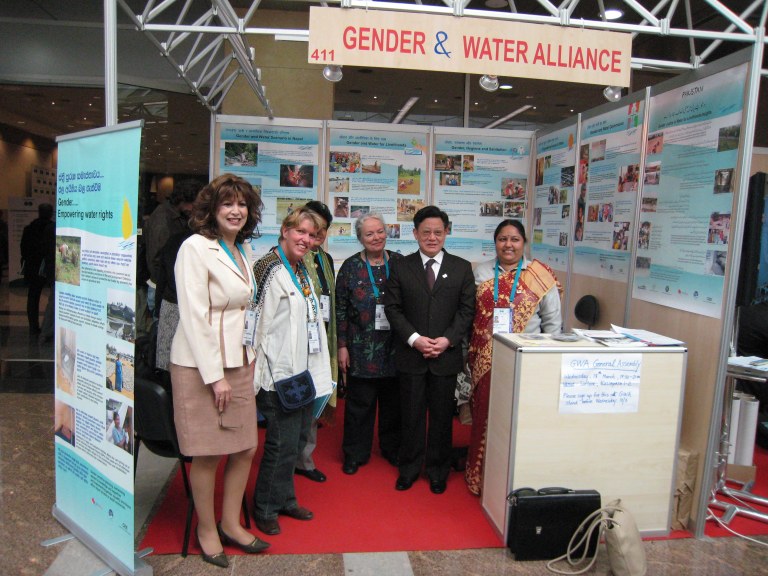Bridging gender divides in water at the Fifth World Water Forum
More than 80 members of the Gender and Water Alliance from across the globe joined up in Istanbul in March this year, at the 5th World Water Forum, in an effort to mainstream gender equity issues in the discussions and emerging recommendations. As “ Bridging divides for water” was the slogan of the Water Forum, GWA aimed to bridge specifically the gender gap in the various agendas. That this was much needed became clear from the start of the water forum, a major global event still very much dominated by men in dark suits discussing business as usual with each other.
Mainstreaming gender
With careful planning and preparation, GWA was able to mainstream gender issues in this Water Forum much more than in those that preceded it. Answering the Forum Secretariat’s call for proposals for thematic sessions last year, GWA members, including staff and Steering Committee members, managed to become conveners, presenters, or panel members in more than 20 sessions. The active participation of GWA members present throughout the forum was also very effective. They did not miss an opportunity to raise gender concerns in all the thematic sessions, side-events, and regional presentations they attended – constantly reminding participants that sustainable development starts with taking into account the diverse needs of different people. They emphasised that for water projects and policies to be successful, women must be recognised as primary users and managers of this resource and need to be involved in decision-making processes, whereby a special focus on the poor and marginalised groups is essential.
That their interventions did not go unnoticed was apparent from the numerous interview requests that many of our members got from journalists. To read some of these interviews, please visit this part of our website
GWA co-convened the High Level Gender Plenary on the opening day of the Water Forum with the UN Task Force on Gender and Water and other partners, and this was a big step forward for putting gender squarely on the water and sanitation agenda. Ministers, members of parliament, and several heads of international organisations openly spoke about the need to include the specific needs of girls and women in menstrual hygiene in school and community sanitation facilities.
Other notable opportunities for mainstreaming gender were the training session on Gender, Water and Waste, the launch of the Resource Guide on Gender and Water Management in four new languages, and the launch of four educational cartoon booklets on Gender and Water.
GWA stall “a crowd puller”
The GWA stall in the Water Expo space of the Water Forum was a big crowd puller, not only due to the interesting and colourful GWA material on display, but also due to the presence of GWA members from all over the world and their dynamic and motivated interaction with visitors. Water engineers, water managers, policy makers, educators and staff from grassroot organisations flocked to share experiences about gender in their work, express their appreciation for our member’s interventions in sessions, and to engage in animated discussions. We even had the official representative of Ban Ki-moon – UN Secretary General – posing with GWA members at the stall!

Work not finished!
By the end of the week, the general feeling among GWA members was that, even though we had gained a lot of visibility and space for gender concerns in this event, we have to be prepared to put in a lot more work, especially to garner political commitment for translating gender-sensitive technology and methodology into action. This was reflected in the statement made by the GWA chair in the formal closing ceremony on the last day of the Water Forum, responding to the Ministerial Declaration coming out of the Forum. She exhorted the ministers present to stop debating whether the right to water and sanitation is a human right and instead, to move forward on how to implement and assure this human right, particularly for the poor and vulnerable, women and children.


